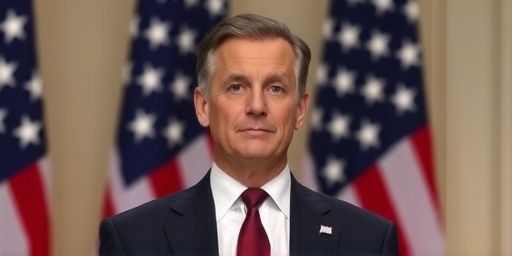In a stunning announcement that has sent shockwaves through the political and health communities, President-elect Donald Trump has nominated Robert F. Kennedy Jr., a prominent environmental lawyer and vocal vaccine skeptic, to lead the Department of Health and Human Services (HHS). The move, revealed during a rally in Florida, positions RFK Jr. as a key figure in Trump‘s incoming cabinet, promising a radical shift in federal health policy amid ongoing debates over public health mandates and scientific consensus.
Trump praised Kennedy as a ‘warrior’ against corporate influence in healthcare, stating, ‘RFK Jr. will restore health to our nation by taking on the deep state of Big Pharma and restoring trust in our institutions.’ This nomination comes just weeks after Trump’s electoral victory, as he assembles a cabinet blending loyalists, outsiders, and unconventional picks to fulfill campaign promises of deregulation and skepticism toward established health narratives.
The selection of RFK Jr. for HHS Secretary underscores Trump’s willingness to challenge mainstream health orthodoxy. Kennedy, nephew of President John F. Kennedy and son of the late Senator Robert F. Kennedy, has long been a lightning rod for controversy due to his leadership of Children’s Health Defense, an organization that promotes anti-vaccine views. His nomination immediately drew praise from Trump’s base but fierce criticism from medical professionals and Democrats, who warn of potential setbacks in vaccination rates and public health preparedness.
RFK Jr.’s Rise from Environmental Activist to Health Policy Maverick
Robert F. Kennedy Jr.’s journey to this high-profile nomination is rooted in decades of activism. Born in 1954 into one of America’s most storied political families, Kennedy initially made his mark in environmental law, founding the Waterkeeper Alliance in 1999 to combat pollution in waterways. His work earned him accolades, including Time magazine’s ‘Hero for the Planet’ in 1999. However, Kennedy’s pivot to health advocacy began around 2005, sparked by concerns over thimerosal, a mercury-based preservative once used in vaccines.
That year, Kennedy penned a widely criticized article in Rolling Stone and Salon titled ‘Deadly Immunity,’ alleging a government cover-up of vaccine risks—a piece later retracted for factual inaccuracies. Undeterred, he founded Children’s Health Defense in 2016, which has grown into a multimillion-dollar organization advocating for vaccine choice and scrutinizing pharmaceutical influences. According to nonprofit trackers, the group reported over $23 million in revenue in 2022, funding campaigns that have amplified misinformation during the COVID-19 pandemic.
Supporters view Kennedy as a fearless truth-teller. During his independent presidential run in 2024, which he suspended to endorse Trump, Kennedy garnered millions of votes by tapping into distrust of federal health agencies like the FDA and CDC. ‘The corruption in our health agencies is profound,’ Kennedy said in a 2023 podcast appearance. ‘They are captured by industry, and it’s time for real change.’ This rhetoric aligns seamlessly with Trump’s ‘drain the swamp’ ethos, making RFK Jr. a natural fit for the HHS role, which oversees a $1.7 trillion budget and agencies responsible for Medicare, Medicaid, and disease prevention.
Yet, Kennedy’s history is dotted with legal battles. In 2019, a New York court dismissed a lawsuit he filed against the HPV vaccine, and fact-checkers have repeatedly debunked his claims linking vaccines to autism—a theory originating from a fraudulent 1998 study. Despite this, his nomination signals Trump’s intent to prioritize alternative health perspectives, potentially reshaping policies on everything from childhood immunizations to opioid crisis responses.
Trump’s Cabinet Strategy: Blending Loyalty with Disruption
Donald Trump’s cabinet nominations have consistently defied conventional wisdom, and the RFK Jr. pick for HHS fits into a broader pattern of selecting outsiders to dismantle what he calls bureaucratic overreach. Since his election win on November 5, 2024, Trump has announced over a dozen cabinet positions, including controversial figures like Matt Gaetz for Attorney General (later withdrawn) and Tulsi Gabbard for Director of National Intelligence. The HHS nomination, however, stands out for its direct impact on public health, an arena where Trump’s first term was marred by COVID-19 controversies.
During his 2017-2021 presidency, Trump clashed with health experts, promoting unproven treatments like hydroxychloroquine while downplaying the virus’s severity. Now, with RFK Jr., Trump appears to double down on that skepticism. In a Truth Social post announcing the nomination, Trump wrote, ‘RFK Jr. understands the corruption better than anyone. Together, we’ll make America healthy again!’ This echoes his campaign pledges to investigate vaccine injuries and reform food safety standards, areas where Kennedy has expertise from his environmental background.
Analysts note that Trump’s cabinet choices prioritize loyalty over traditional qualifications. A 2024 Pew Research Center survey found that 62% of Republicans support greater scrutiny of vaccine policies, a sentiment Kennedy embodies. The nomination also serves political ends: by elevating RFK Jr., Trump rewards an ally who brought disillusioned independents into his fold during the election. With the Republican Senate majority secured, confirmation seems likely, though not without hurdles. Historical data from the Senate’s confirmation process shows that health-related nominees face intense scrutiny; for instance, Trump’s 2017 pick for HHS, Tom Price, resigned amid ethics scandals, highlighting the position’s volatility.
Economically, the HHS role influences vast sectors. The department regulates pharmaceuticals, with the FDA approving drugs worth billions annually. Kennedy’s push for transparency could lead to deregulation, potentially lowering drug prices but risking safety standards. Industry groups like PhRMA have already expressed concerns, with a spokesperson stating, ‘We respect diverse viewpoints but urge evidence-based leadership for HHS.’
Health Community Backlash: Fears of Eroding Vaccine Confidence
The medical establishment’s reaction to RFK Jr.’s nomination has been swift and severe, with experts warning of dire consequences for public health. The American Medical Association (AMA) issued a statement calling the pick ‘deeply troubling,’ emphasizing that ‘HHS leadership must uphold scientific integrity, not promote debunked theories.’ Dr. Paul Offit, a vaccine developer and Children’s Hospital of Philadelphia director, tweeted, ‘This is a disaster. RFK Jr. has spent years spreading falsehoods that cost lives. Vaccines save 2-3 million lives yearly, per WHO data— we can’t afford regression.’
Indeed, vaccine hesitancy remains a global concern. The CDC reports that U.S. childhood vaccination rates dipped to 93% for MMR in 2023, below the 95% herd immunity threshold, partly due to misinformation amplified during the pandemic. Kennedy’s organization has been linked to such trends; a 2021 study in The Lancet found anti-vaccine content correlated with a 5-10% drop in immunization uptake in affected communities.
Democrats, still reeling from the election loss, have mobilized against the nomination. Senate Minority Leader Chuck Schumer decried it as ‘a dangerous gamble with American lives,’ vowing rigorous hearings. Representative Raja Krishnamoorthi, a key voice on health policy, told CNN, ‘RFK Jr.’s views aren’t just fringe—they’re harmful. Confirming him would undermine decades of progress against preventable diseases.’ Progressive groups like MoveOn are launching ad campaigns, citing Kennedy’s 2023 claim that COVID vaccines are ‘the deadliest vaccine ever made,’ a statement contradicted by data showing over 13 billion doses administered worldwide with rare severe side effects.
On the flip side, some public health advocates applaud the focus on chronic diseases. Kennedy has highlighted environmental toxins’ role in conditions like autism and obesity, aligning with rising concerns. A 2024 NIH report estimates environmental factors contribute to 20% of childhood developmental disorders, an area where HHS could innovate under his watch. Nonetheless, the consensus among epidemiologists is caution: a weakened CDC under skeptical leadership might falter in future outbreaks, echoing the 1918 flu’s lessons on trust in science.
Navigating Confirmation: Senate Battles and Policy Shifts Ahead
As the nomination heads to the Senate, where Republicans hold a 53-47 edge, RFK Jr.’s confirmation process promises fireworks. Hearings could begin as early as January 2025, with the Senate Health, Education, Labor, and Pensions (HELP) Committee leading the charge. Chaired by Sen. Bill Cassidy (R-LA), a physician who supports vaccines, the committee may press Kennedy on his views. Past nominees, like Xavier Becerra in 2021, faced hours of questioning; Kennedy’s sessions could stretch longer given the stakes.
Potential roadblocks include bipartisan moderates like Sens. Susan Collins and Lisa Murkowski, who have signaled reservations. Advocacy groups are mobilizing: the Autism Society of America, wary of Kennedy’s unsubstantiated links, plans testimony, while pro-choice organizations fear impacts on reproductive health funding. Trump’s team, however, is confident, pointing to Kennedy’s legal acumen and family legacy as assets.
Looking forward, a confirmed RFK Jr. at HHS could herald sweeping changes. Priorities might include auditing vaccine approval processes, expanding access to alternative therapies, and tackling ‘ultra-processed’ foods—a Kennedy staple. The department’s 80,000 employees would adapt to a new vision, potentially clashing with career scientists. Broader implications extend to global health; HHS influences WHO funding, and Kennedy’s skepticism could strain U.S. leadership in pandemics.
Ultimately, this nomination tests America’s appetite for disruption in health governance. As Trump reshapes his cabinet, the HHS pick could define his second term’s legacy—either as a bold reform or a risky pivot from evidence-based policy. Stakeholders on all sides brace for a transformed landscape, where questions of trust, science, and politics collide at the nation’s health forefront.








